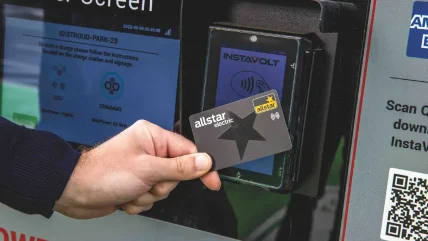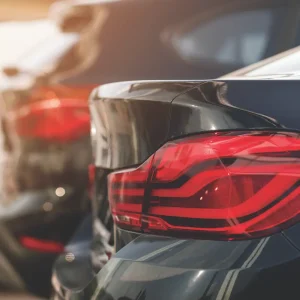
Allstar may be a name traditionally associated with fuel cards, but catering to the needs of fleets running EVs is an increasingly important part of its activities. To this end, it has established the Allstar Chargepass proposition, which brings together the Allstar One Electric card, established in 2019, with Allstar Homecharge, which was created following parent company Fleetcor’s acquisition of home charging payment service Mina last year. The One Electric card allows users to pay for public EV charging as well as petrol or diesel fill-ups, while the Homecharge service allows the cost of fleet drivers charging at home to be met via payments direct from their employer to the driver’s energy supplier (with a system for separating business and personal mileage if needed).
Ashley Tate, the former CEO and founder of Mina, who is now managing director of Allstar Chargepass UK, says the idea is to give fleets a one-stop-shop for their electric transition.
He says: “Pretty much every customer of ours, I would say 90%, run what we term as mixed fleets, so vehicles that are still petrol and diesel and vehicles that are now electric.
“You can go to a single dashboard, see every driver, whether they are traditional fuel or electric, and see all the costs of fuelling, all in a single place, as well as receive a single invoice for all of those costs.”
Tate tells us that the desire to have everything together relates to a broader problem with the EV supply chain in general.
He says: “You’ve got very detached entities doing very distinct things. For example, home chargepoint manufacturers, workplace chargepoint manufacturers, companies trying to create their own ecosystem. It’s not as connected generally as we’ve seen in fuel.
“Our purpose really at Allstar Chargepass is to bring everything a fleet needs all under one roof.”
Tate is clear about the cost advantages to fleets of drivers charging EVs at home, but says that among Allstar Chargepass customers the home/public charging split is around 50/50.
He says: “We have far more cards in circulation than we have Homecharge users, and mainly that is because, even if you can charge at home, you will still need to charge on the road at some point, even if it’s once or twice a year, so having that card as a back-up is still essential.
“And if you can’t charge at home, you’re always going to charge on the road, so what we see is pretty much 100% of EV users will have a card, and will charge on the road, and what we are very much trying to promote is the importance of charging at home.”
As Tate explains, a challenge with promoting home charging to fleets is how different it is to filling up with traditional fuel, in comparison with public charging.
He says: “A lot of people are going from a fuel card, where you go to a petrol station and you pay for it. Public charging is very similar to that concept – you go to a public charging station, you plug your car in, you pay for it – [compared with] this concept of someone taking their car home, and the payment being made to their energy supplier, [although] what we’ve done is make this very simple, because it’s a single invoice to the business – essentially home just becomes another fuel station. The way we’ve built the system, it’s paid for in exactly the same way.”
New EV demand in the UK is currently heavily weighted towards the company car market, with this being driven by the highly favourable BIK tax rates that are available. These are such a motivation that Tate does not expect the UK Government delaying its new petrol and diesel car ban to have any impact on the sector.
He says: “In the car fleet space, certainly the electric car space, I don’t think it’s going to make any difference whatsoever. The reason people are buying EVs today is not because of the 2030 ban. They are buying them because it makes financial sense today.
“Most people will be changing their car again before 2030, so it’s not like we’re [so] close to a cliff edge that that’s a huge driver. It is definitely a cost analysis thing, and very much driven by the tax.”
Tate explains that among fleet customers, the level of EV ambition has taken a clear step forward in recent years.
He says: “Every conversation we have now about a new sale is generally talking about EV. All the big fleets, all the corporates, are transitioning. We’ve got customers where they have EV-only company car policies.
“It’s definitely moved on drastically. Three years ago, I remember having conversations where most of the conversation was along the lines of ‘we’re testing EVs’. Those conversations don’t really happen anymore, people know that they have to move
to electric.”
When we ask Tate if even he has been surprised by the explosion of EVs in the company car market, he explains that he is still expecting to see consistent overall growth, while acknowledging that some factors would prompt jumps in demand along the way.
He says: “One of the only things in the world that we are almost certain of, is that at some point in the near future, within 10 to 15 years, we’re likely to see more EVs on the road than petrol and diesel vehicles.
“The uptake in demand spikes for various different reasons – as soon as fuel prices spike, demand for EVs goes up. Certainly, BIK is driving that pretty consistently, driving the
base demand.
“If you look at the charts, there’s not been a hockey stick moment, where suddenly we’ve seen the number of EVs on the road quadruple in a quarter or in a year, but it’s growing fast, and I think we will soon be in a place where you will go into a car showroom and struggle to buy a new vehicle that isn’t an EV.”
The Allstar One Electric network includes more than 14,000 public chargers, from 17 providers. When we ask Tate for his views on the state of public charging, he explains his belief that clear progress has been made.
He says: “I think gone are the days when we used to see two chargers at a motorway service station and one of them was out of order. There’s been so much investment in public infrastructure.
“Range anxiety was a thing, charge anxiety has almost become the new thing – can I find a charger, will it be rapid, will it be available, will I have to queue – and the way that the chargepoint operators are thinking about deploying infrastructure and deploying it currently means they are doing everything they can to eradicate those fears.
“From a personal view, it seems to be working. Very rarely do I hear anyone say ‘I’ve got an EV and I’m going back to fuel because I can’t find anywhere to charge it’. That was the case three or four years ago, it’s not so much the case anymore.”





